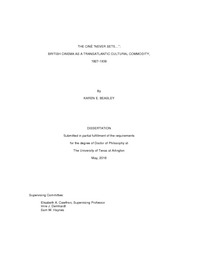
ATTENTION: The works hosted here are being migrated to a new repository that will consolidate resources, improve discoverability, and better show UTA's research impact on the global community. We will update authors as the migration progresses. Please see MavMatrix for more information.
Show simple item record
| dc.contributor.advisor | Cawthon, Elisabeth A. | |
| dc.creator | Beasley, Karen E. | |
| dc.date.accessioned | 2016-07-08T21:02:12Z | |
| dc.date.available | 2016-07-08T21:02:12Z | |
| dc.date.created | 2016-05 | |
| dc.date.issued | 2016-05-10 | |
| dc.date.submitted | May 2016 | |
| dc.identifier.uri | http://hdl.handle.net/10106/25807 | |
| dc.description.abstract | This dissertation exemplifies how the application of a transatlantic commodity approach can broaden understanding of film as a mass medium, its business, and its cultural influences. By employing a more inclusive national cinema framework, this study is able to investigate sites of interaction between the British and Hollywood film industries as a two-way exchange as well as engage those sites at their peripheries, including those between the cultural product and its consumer throughout the broader Atlantic community. This dissertation focuses on the diversity of British audiences throughout a “British world” and the distribution and exhibition methods used to reach them. Based less on the profitability of internationally-exported British films, this British film history enlarges the frame to draw upon these transatlantic connections to adjust and provide a more comprehensive look at British Cinema of the 1930s.
A British imperial film culture propagated cultural ties to the homeland through the government’s support of a domestic industry, the endeavors of British filmmakers to build a competitive and distinctively British film product, and the machinations of businessmen attempting to distribute this British output to consumers worldwide with a particular focus upon fellow British and English-speaking peoples, especially with the advent of sound motion pictures. British films were dispersed to both vital and subsidiary markets to establish a more international and presumably profitable market through the reliance upon British cultural similarities and interests of peoples throughout English-speaking markets. Coming from a nearly obliterated industry of the mid-1920s, the growth and development of the industry relied heavily upon the perceived cultural value of their product.
Extensive use of various legal and business documents, especially from the United Artists corporation records, sheds light upon two independent British producers’ aims, means, and attempts to acquire access to the US market in contrast to the methods employed by the major British combine Gaumont British. Furthermore, the UA archive provided this study an opportunity to explore the distribution and exhibition patterns in other overseas markets and expand upon British film scholarship within these specific areas, including Canada, South Africa, the British West Indies, and even beyond the Atlantic to Australia.
This study argues that a distinctive national cinema was created and built upon in Britain during the interwar years, particularly during this decade; this distinction is reflected in the transatlantic interactions of the business and in the films’ use as supposed representatives of Britishness and as a British-made product. By engaging the latter, connections are drawn between the economic side of the film industry and the cultural component of the medium’s dispersal to consumers. To do so, this dissertation explores trends in how Britishness is portrayed in the films’ marketing and advertising in the English-speaking market with a particular focus upon South Africa and the British Caribbean. A qualitative analysis of the supply side’s marketing and publicity supports that with the British film industry’s growth and increased efforts for international distribution, British films became increasingly perceived as an entertaining alternative to Hollywood product. They were able to negotiate a degree of space within each of these markets by the mid-1930s; and with the creation of this space, British films of following decades would continue to have an outlet in these markets. | |
| dc.format.mimetype | application/pdf | |
| dc.language.iso | en_US | |
| dc.subject | British cinema | |
| dc.subject | Film history | |
| dc.subject | National cinema | |
| dc.subject | Commodity | |
| dc.subject | Economic history | |
| dc.subject | Transatlantic | |
| dc.subject | Great Britain | |
| dc.subject | South Africa | |
| dc.subject | United States | |
| dc.subject | Caribbean | |
| dc.subject | Jamaica | |
| dc.subject | Bermuda | |
| dc.subject | Bahamas | |
| dc.subject | Cinema-going | |
| dc.subject | Film distribution | |
| dc.subject | British film | |
| dc.subject | Film publicity | |
| dc.subject | Motion pictures | |
| dc.subject | United Artists | |
| dc.subject | Gaumont British | |
| dc.subject | London films | |
| dc.subject | British empire | |
| dc.subject | Britishness | |
| dc.subject | British identity | |
| dc.subject | English identity | |
| dc.title | THE CINÉ “NEVER SETS…”: BRITISH CINEMA AS A TRANSATLANTIC CULTURAL COMMODITY, 1927-1938 | |
| dc.type | Thesis | |
| dc.degree.department | History | |
| dc.degree.name | Doctor of Philosophy in Transatlantic History | |
| dc.date.updated | 2016-07-08T21:04:20Z | |
| thesis.degree.department | History | |
| thesis.degree.grantor | The University of Texas at Arlington | |
| thesis.degree.level | Doctoral | |
| thesis.degree.name | Doctor of Philosophy in Transatlantic History | |
| dc.type.material | text | |
| dc.creator.orcid | 0000-0002-9048-770X | |
Files in this item
- Name:
- BEASLEY-DISSERTATION-2016.pdf
- Size:
- 3.350Mb
- Format:
- PDF
This item appears in the following Collection(s)
Show simple item record


